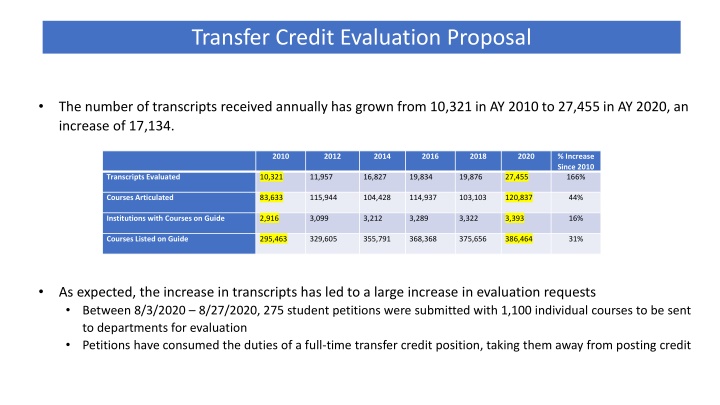
Efficient Transfer Credit Evaluation Proposal for Academic Institutes
Explore a detailed proposal to streamline the transfer credit evaluation process, addressing the challenges faced by academic institutions due to increased transcript submissions. The solution involves categorizing courses for quicker processing and providing core equivalencies promptly to enhance student enrollment experiences.
Uploaded on | 1 Views
Download Presentation

Please find below an Image/Link to download the presentation.
The content on the website is provided AS IS for your information and personal use only. It may not be sold, licensed, or shared on other websites without obtaining consent from the author. If you encounter any issues during the download, it is possible that the publisher has removed the file from their server.
You are allowed to download the files provided on this website for personal or commercial use, subject to the condition that they are used lawfully. All files are the property of their respective owners.
The content on the website is provided AS IS for your information and personal use only. It may not be sold, licensed, or shared on other websites without obtaining consent from the author.
E N D
Presentation Transcript
Transfer Credit Evaluation Proposal The number of transcripts received annually has grown from 10,321 in AY 2010 to 27,455 in AY 2020, an increase of 17,134. 2010 2012 2014 2016 2018 2020 % Increase Since 2010 166% Transcripts Evaluated 10,321 11,957 16,827 19,834 19,876 27,455 Courses Articulated 83,633 115,944 104,428 114,937 103,103 120,837 44% Institutions with Courses on Guide 2,916 3,099 3,212 3,289 3,322 3,393 16% Courses Listed on Guide 295,463 329,605 355,791 368,368 375,656 386,464 31% As expected, the increase in transcripts has led to a large increase in evaluation requests Between 8/3/2020 8/27/2020, 275 student petitions were submitted with 1,100 individual courses to be sent to departments for evaluation Petitions have consumed the duties of a full-time transfer credit position, taking them away from posting credit
Transfer Credit Evaluation Proposal Current Situation All courses are pulled from petition and sent to department reviewer in that subject area along with a course description Reviewers are asked to respond with an approved equivalent Responses can be very slow - some take well over 6 weeks or more o Reminders are sent after 5-10 business days - takes time to send these o Slower response in summer - summer is a busy time for transfer evaluations, but many evaluators are not on campus and some may not be on contract Impacts student s enrollment, particularly if the course is a prerequisite Doesn t allow student to know outstanding graduation requirements before enrolling Many courses are general education courses and fall within ACTS over 50% Calls about evaluations prevent staff from posting credit
Transfer Credit Evaluation Proposal Proposed Solution Have registrar s office determine core equivalencies when it is obvious and within the ACTS course descriptions. This would allow the equivalency to be processed immediately and with the same equivalency the department would likely grant. Courses that aren t obvious core equivalencies would be sent to department. Courses that aren t part of core, including all upper level courses, would be sent to the department. Courses that aren t equivalent to one of our core courses, but that do fall within a core category and served as core at the transfer institution, may be given a 199TT or 299TT coding which would allow for core credit. For instance, HUMN 1301 Introduction to Humanities from Dallas County Community College transfers to UA as HUMN 199T, a general elective in humanities. When petitioned to Academic Standards, the course is allowed to be used as a core humanity. If a student transferred in HUMN 2301 Humanities from UAPB, it would automatically be given HUMN 299TT and count as a humanities core because it is part of their core (Act 182).
Transfer Credit Evaluation Proposal Proposed Evaluation Process 1. Transcript is received by registrar s office and courses articulated based on current equivalency assignments. 2. Courses with no equivalency will be initially reviewed by the Registrar and the Director of Student Records and Transfer Credit. If determined that the class has an obvious core equivalency at UA then it will be assigned. This will be guided by: ACTS Course List, PDF ACTS Course Descriptions, PDF 3. If course doesn t have a core equivalency, but fits a core category, then it will by assigned the subject code with 199TT or 299TT designating it as general core. General education requirements at transfer institution will be considered in evaluation 4. Courses that are upper level or don t fit within a university core category will be sent to the department to evaluate. 5. Students can petition to have an assigned course equivalency reevaluated by the appropriate academic department.
Petition from Western Oregon University Core to Core Equivalencies
Petition from Western Oregon University Core to Core Equivalencies WR 115 College Writing I WR 122 College Writing II TA 110 Intro to Theatre Arts PSY 201 General Psychology > > > > ENGL 1013 Composition I ENGL 1023 Composition II THTR 1003 Theatre Appreciation PSYC 2003 General Psychology
Petition from South Texas College ACTS Course and Core Equivalency BIOL 2461: Microbiology for Sci Majors PHIL 1301 Intro to Philosophy
Petition from South Texas College ACTS Course and Core Equivalency BIOL 2421 Microbiology for Sci Majors > BIOL 2013/2011 General Microbiology PHIL 1301 Intro to Philosophy > PHIL 2003 Intro to Philosophy
Petition from Kilgore College Chemistry and No Transfer(NOTR) Course Petition Example of Petition Forwarded to Department
Petition from Kilgore College Chemistry and No Transfer(NOTR) Course Petition Example of Petition Forwarded to Department CHEM 1406 Introductory Chemistry I > Dept Review VNSG 1420 Anatomy and Physiology for Allied Health > Dept Review - 30 -
